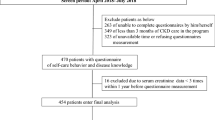Abstract
Purpose
We previously performed a preliminary 6-month controlled trial to examine the effect of a disease management education program on prolongation of the time to renal replacement therapy (RRT) and/or avoidance of RRT for patients with diabetic nephropathy. However, its duration was too short to follow the changes of renal function, so we performed the present study for 24 months.
Methods
This was a two-group comparative study. The intervention group received self-management education from disease management nurses and was supported by the nurses in cooperation with their primary physicians for 12 months. Then this group was followed for a further 12 months. The control group received standard care and was followed for 24 months.
Results
Of the 31 subjects enrolled in each group, 26 subjects in the intervention group and 27 subjects in the control group were analyzed after excluding drop-outs. During the study period, 0 and 2 subjects in the intervention and the control group started RRT, respectively. In the intervention group, renal function was maintained, while significant worsening was observed in the control group. Hemoglobin A1c (HbA1c) improved in the intervention group, but became significantly worse in the control group. In the intervention group, all process indicators of behavior modification increased significantly after intervention.
Conclusion
A well-designed disease management program might be useful for maintaining renal function and improving HbA1c in patients with diabetic nephropathy. It is considered that modification of patient behavior contributed to these results.




Similar content being viewed by others
References
Williams ME (2010) Diabetic CKD/ESRD 2010: a progress report? Semin Dial 23:129–133
Iseki K (2005) Predictors of diabetic end-stage renal disease in Japan. Nephrology 10:S2–S6
Grace BS, Crayton P, Mcdonald SP (2012) Increases in renal replacement therapy in Australia and New Zealand: understanding trends in diabetic nephropathy. Nephrology 17:76–84
Locatelli F, Pozzoni P, Vecchio L (2004) Renal replacement therapy in patients with diabetes and end-stage renal disease. J Am Soc Nephrol 15:S25–S29
Ginieri-Coccossis M, Theofilou P, Synodinou C, Tomaras V, Solldatos (2008) Quality of life, mental health and health beliefs in haemodialysis and peritoneal dialysis patients: Investigating differences in early and later years of current treatment. BMC Nephrol 9:14
Mapes DL, Lopes AA, Satayathum S et al (2003) Health-related quality of life as a predictor of mortality and hospitalization: The dialysis outcomes and practice patterns study(DOPPS). Kidney Int 64:339–349
Japanese Society of Nephrology (2013) Evidence-based practice guideline for the treatment of CKD. Tokyo Igakusha, Tokyo (in Japanese)
Nakatani T, Uchida J, Nitta Y et al (2008) Medical economics of treatment for chronic renal failure (transplantation/dialysis). Tranplantation Now 23:143–148 (in Japanese)
Ministry of Health, Labour and Welfare Renal disease control committee (2008): The future of renal disease control. http://www.mhlw.go.jp/bunya/kenkou/jinshikkan/01.html Accessed 4 April 2014
Wauters JP, Bosson JL, Forneris G et al (2004) Patient referral is influenced by dialysis center structure in the Diamant Alpin Dialysis cohort study. Nephrol Dial Transplant 19:2341–2346
Buren PNV, Toto R (2013) Current update in the management of diabetic nephropathy. Curr Diabetes Rev 9:62–77
Alicic RZ, Tuttle KR (2010) Management of the diabetic patient with advanced chronic kidney disease. Semin Dial 23:140–147
Howe RS (2005) Disease management context and model. The disease manager’s handbook, 1st edn. Jones and Bartlett Learning, Massachusetts, pp 1–5
Kazawa K, Moriyama M (2013) Effects of a self-management skills acquisition program on pre-dialysis patients with diabetic nephropathy. Nephrol Nurs J 40:141–149
Kazawa K, Moriyama M (2013) Effects of the educational program for pre-dialysis patients with diabetic nephropathy (intervention evaluation for 6 months). J Jpn Acad Nephrol Nurs 14(2):92–100 (in Japanese)
Joss N, Ferguson C, Brown C et al (2004) Intensified treatment of patients with type 2 diabetes mellitus and overt nephropathy. QJM: Int J Med 97:219–227
Gaede P, Lund-Andersen H, Parving HH et al (2008) Effect of a multifactorial intervention on mortality in type 2 diabetes. N Engl J Med 358:580–591
Prochaska JO, Velicer WF (1997) The transtheoretical model of health behavior change. Am J Health Promot 12:38–48
Japanese Society of Nephrology (2009) Evidence-based practice guideline for the treatment of CKD. Tokyo Igakusha, Tokyo(in Japanese)
Japan Diabetes Society (2009) Evidence-based practice guideline for the treatment of diabetes. Tokyo Nankodo, Tokyo (in Japanese)
Bandura A (1977) Self-efficacy: Toward a unifying theory of behavioral change. Psychol Rev 84:191–215
Gustafson D, Wise M, Bhattacharya A et al (2012) The effects of combining web-based eHealth with telephone nurse case management for pediatric asthma control: a randomized controlled trial. J Med Internet Res 14(4):e101
Kim WS, Shimada H, Sakano Y (1996) The relationship between self-efficacy on health behavior and stress responses in chronic disease patients. Jpn J Psychosoma Med 36:499–505 (in Japanese)
Tazaki M, Nakane Y (2007) Introduction to WHOQOL26. Kaneko Shobo, Tokyo (in Japanese)
Gaede P, Vedel P, Larsen GV et al (2003) Multifactorial intervention and cardiovascular disease in patients with type 2 diabetes. N Engl J Med 348:383–393
Scottish Intercollegiate Guidelines Networks (SIGN) (2008) SIGN 103: Diagnosis and management of chronic kidney disease. http://www.sign.ac.uk/pdf/sign103.pdf Accessed 4 April 2014
American Diabetes Association (2003) Diabetic nephropathy. Diabetes Care 26:94–98
Acknowledgments
We would like to express our deepest gratitude to the Kure City medical insurance staff who provided the field for this study. We are also indebted to the disease management nurses for their support.
Conflict of interest
The authors declare that they have no conflicts of interest.
Ethical standards
Approval was obtained from the ethics committees of Hiroshima University Hospital and the participating medical institutions. All subjects gave written consent to participation and the study was performed according to the Declaration of Helsinki.
Author information
Authors and Affiliations
Corresponding author
Rights and permissions
About this article
Cite this article
Kazawa, K., Takeshita, Y., Yorioka, N. et al. Efficacy of a disease management program focused on acquisition of self-management skills in pre-dialysis patients with diabetic nephropathy: 24 months follow-up. J Nephrol 28, 329–338 (2015). https://doi.org/10.1007/s40620-014-0144-2
Received:
Accepted:
Published:
Issue Date:
DOI: https://doi.org/10.1007/s40620-014-0144-2




